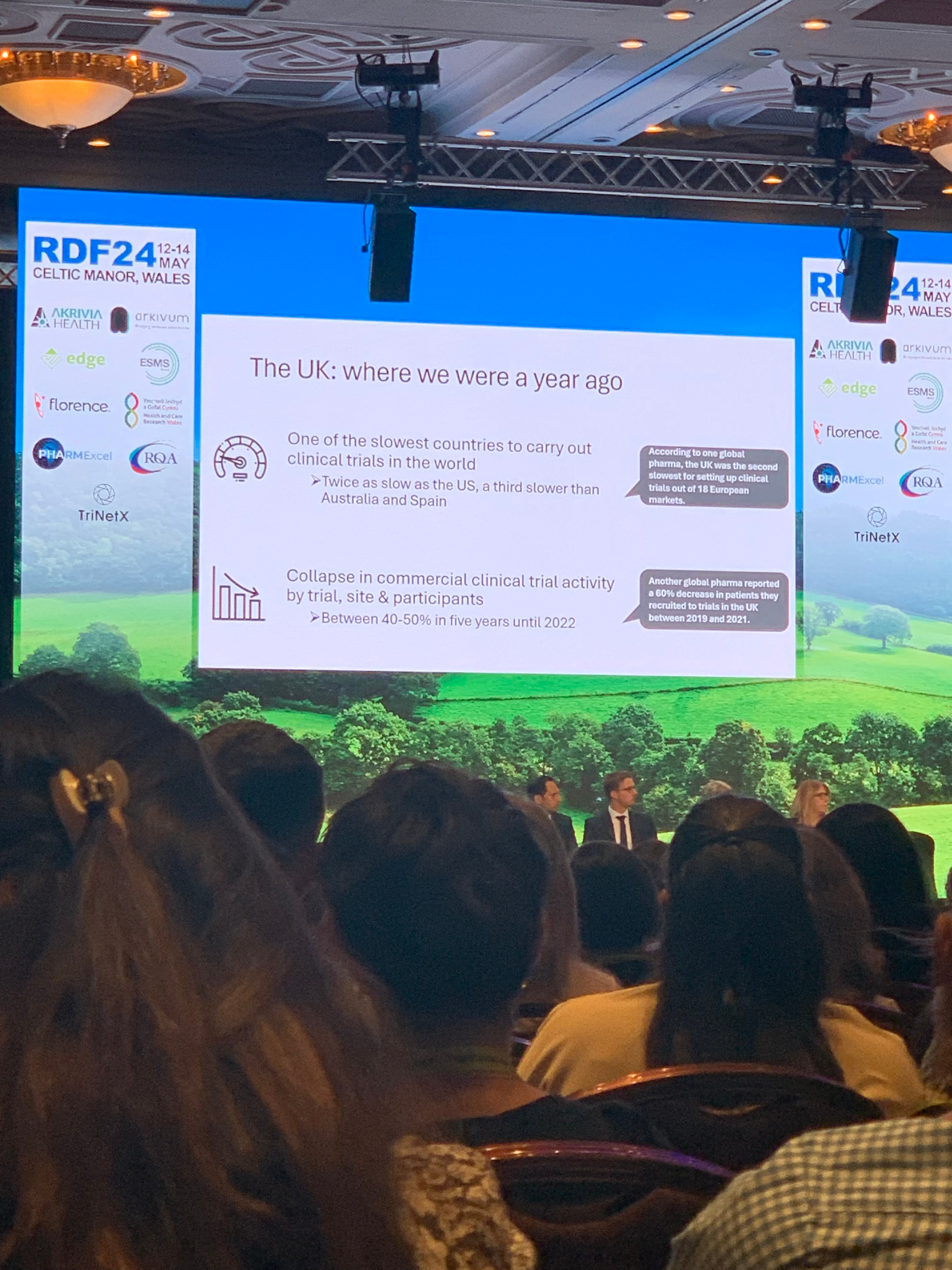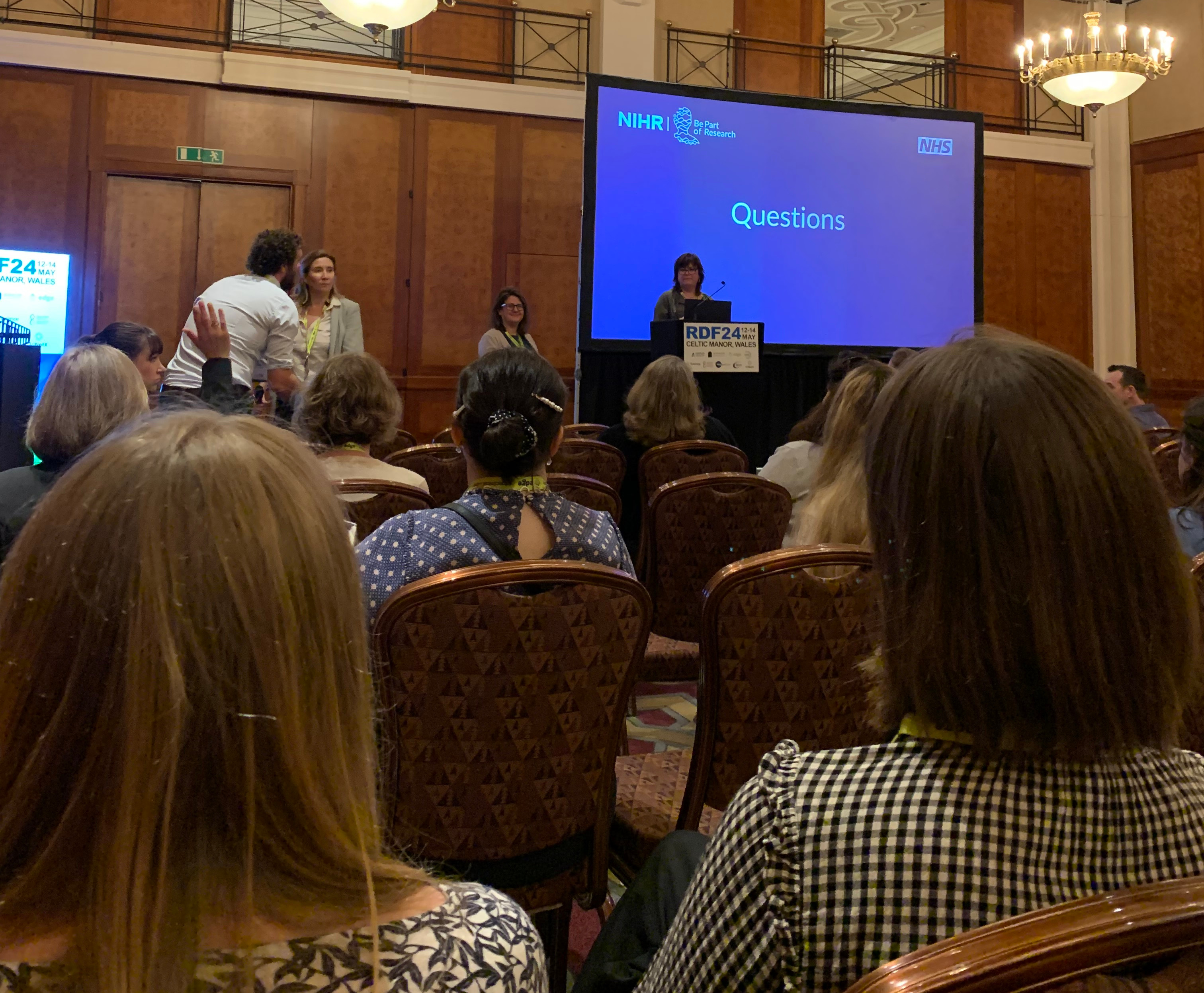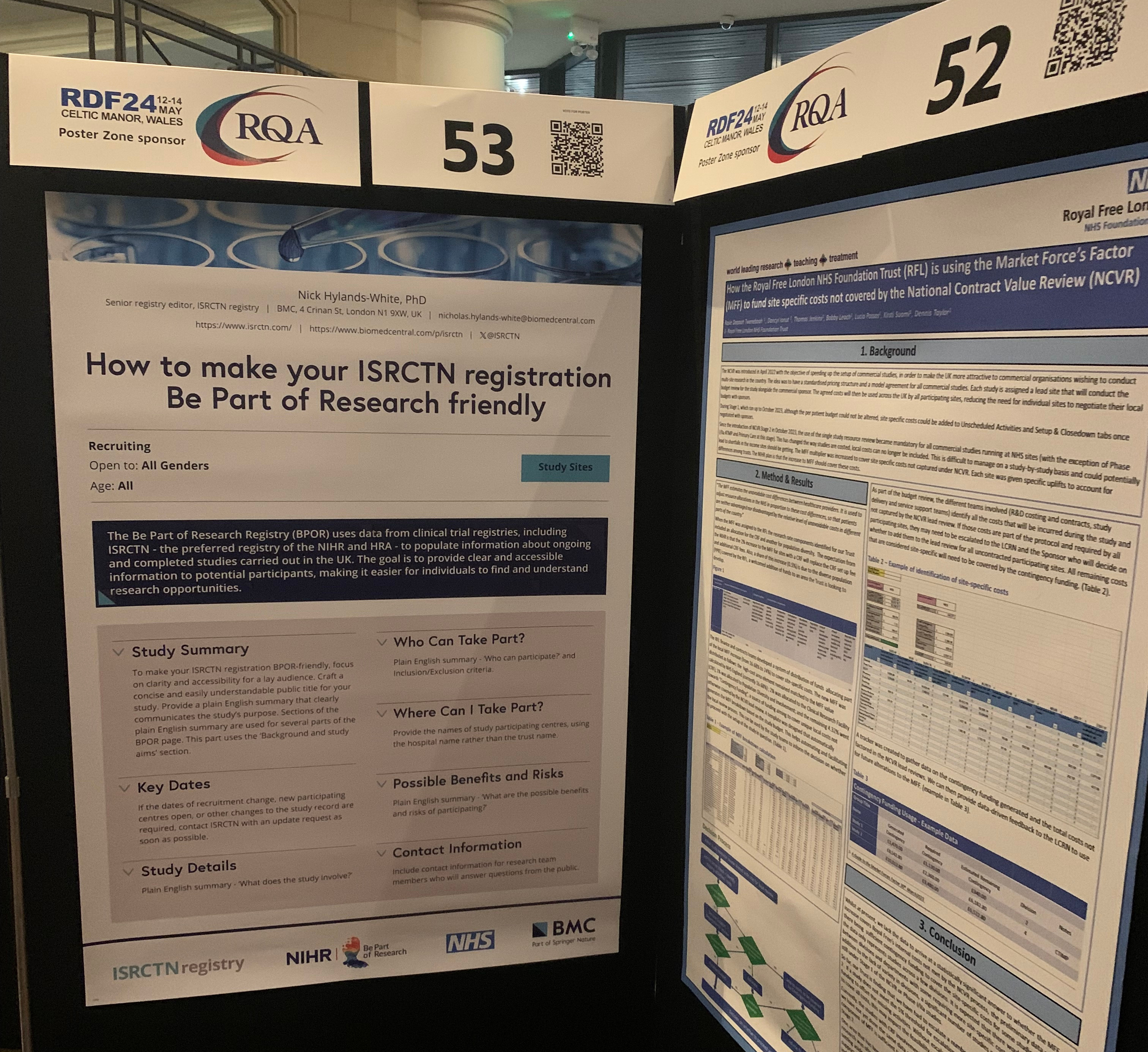NHS Research & Development Forum 2024
Published in Biomedical Research

RDF24, the 2024 Annual Conference of the NHS Research & Development Forum took place at Celtic Manor, Wales from 12 - 14 May 2024. The event brought together more than 870 attendees from across health and care research management and featured more than 60 speakers, 25 exhibitors, 100 posters and provided a unique opportunity for learning, developing and networking.
Four of the sessions most relevant to clinical study registration are summarized below.
UK Commercial Clinical Trials Review - 1 year on
Lord O'Shaughnessy is a former Conservative health minister and led the recent independent review of commercial clinical trials in the UK for the British government, published in May 2023.
 James O'Shaughnessy reflected on the progress of NHS research and development. Despite successes in life sciences research, the UK faced significant hurdles, particularly in setting up commercial trials. O'Shaughnessy highlighted the slow trial setup and regulatory challenges that had led to a decline in commercial trials, negatively impacting patients and the economy. He contrasted this with countries like Spain, Australia, and Poland, which had more efficient trial setups, suggesting that policy changes were essential for improvement.
James O'Shaughnessy reflected on the progress of NHS research and development. Despite successes in life sciences research, the UK faced significant hurdles, particularly in setting up commercial trials. O'Shaughnessy highlighted the slow trial setup and regulatory challenges that had led to a decline in commercial trials, negatively impacting patients and the economy. He contrasted this with countries like Spain, Australia, and Poland, which had more efficient trial setups, suggesting that policy changes were essential for improvement.
The potential of the life science industry in the UK is immense, contributing to 5% of GDP and 300,000 jobs. However, O'Shaughnessy pointed out missed opportunities for investment and innovation, exemplified by AstraZeneca's decision to establish its global R&D center in Barcelona. He argued that the UK should have been more competitive in attracting industry investments.
To improve clinical trials, O'Shaughnessy emphasized the need for collaboration and innovation. He acknowledged the importance of R&D efforts for better healthcare and economic growth, thanking contributors for identifying problems and creating recommendations. One significant issue was the lack of transparency in trial data, which hampered accountability and collaboration. O'Shaughnessy advocated for higher status and incentives for research within the NHS, aiming to integrate clinical trials into routine care to address health inequalities and reach marginalized communities.
Improving NHS clinical trial activity involved enhancing data sharing and patient involvement. O'Shaughnessy shared his personal experience with a brain tumor diagnosis to underscore the importance of data in clinical trials. He called for a greater focus on the commercial side of clinical trials, setting an ambitious goal to quadruple activity. Leadership was crucial in driving NHS R&D, with a need for a world-leading platform. Balancing commercial and non-commercial trials and developing a robust pipeline of research-active GP trusts and federations were also critical concerns.
O'Shaughnessy discussed the need for a more matrixed approach to clinical trial delivery, focusing on matching patients with therapies based on disease rather than location. While technology had the potential to simplify clinical trial processes, current investments were primarily in drug discovery rather than trial execution. He identified the lack of time as the biggest challenge in healthcare research and called for creative solutions to address the funding gap.
Overall, O'Shaughnessy painted a picture of a promising yet underachieving UK clinical trial landscape. By addressing regulatory inefficiencies, enhancing transparency, and fostering greater industry collaboration, the UK could better leverage its strengths in life sciences research to improve patient care and economic growth.
LINK TO SLIDES for this session.
The future clinical trial regulations
Catherine Blewett, senior development manager at the Health Research Authority (HRA), discussed upcoming changes to clinical trial regulations in the UK. Blewett, who has a background in EU clinical trials regulation and experience with the combined review process, emphasized the necessity for updating current legislation to better align with the government's Life Sciences vision. The new regulations aim to streamline processes, reduce unnecessary burdens, and facilitate the development of new medicines while maintaining robust oversight.
Key changes include:
- Expanded Roles for Healthcare Professionals:
- The role of the chief investigator in clinical trials has been revised to provide more flexibility. The requirement for an "authorized" healthcare professional is removed, allowing a broader range of healthcare professionals to act as chief investigators.
- New Definitions and Committee Requirements:
- Non-invasive investigational medicinal products are introduced, defined as products used in trials but not classified as investigational medicinal products.
- The term "participant" replaces "subject" to reflect a more modern and inclusive approach.
- Regulations now stipulate a minimum of five members to review and evaluate the scientific and ethical aspects of proposed trials. Committee meetings must have a legal quorum to proceed.
- Streamlined Review Process:
- Combined review of clinical trials is now standard, reducing duplication and improving efficiency. Exceptions may be allowed in certain circumstances, such as international trials.
- The Medicines and Healthcare products Regulatory Agency (MHRA) has a new regulation providing a legal basis for the notification scheme, replacing the previous voluntary submission scheme.
- Ethics committees will consider factors such as risk proportionality and informed consent to protect participant interests.
- Timelines for Ethics Committees and MHRA:
- A new validation check will be conducted within seven days of receiving an application, followed by a 30-day assessment period by the MHRA. This aligns the timelines of the Ethics Committee and MHRA.
- Modifications and Amendments to Trials:
- Changes to clinical trials that do not significantly impact participant safety or rights may not require MHRA assessment and review.
- Updated timelines provide more flexibility, including a seven-day validation phase and a phase for requesting further information.
- Transparency and Flexibility:
- Emphasis on transparency includes requirements for trial registration within 90 days post-approval and summary results publication within 12 months, with exceptions for early phase CROs.
- New provisions allow for the automatic deferral of clinical trial data for 30 months, extendable up to 10 years with justification.
- Pharmacovigilance and Ethics Committees:
- The MHRA can suspend trials in case of serious breaches and take corrective actions.
- The regulation grants legal powers to the MHRA to collaborate with ethics committees and provide support for trial participants.
Blewett highlighted the ongoing efforts to develop detailed guidance for implementing these new regulations, ensuring a smoother transition and continued protection for trial participants.
LINK TO SLIDES for this session.
UK Approvals Service (Integrated Research Application System - IRAS)
Alastair Nicholson and Phillip Good (HRA) discussed the future of the UK approval service for research projects. The session highlighted the origins of the UK approval service and its connection to IT systems, as well as insights into the future of the research delivery network and the concept of a minimum viable replacement.
The UK's research ethics approval process has evolved over time. In 2008, the first centralized decision-making criteria for research ethics were established. In 2018, the UK Compatibility Programme replaced HRA approval with HRA and HCRW approval in England and Wales, while Scotland and Northern Ireland remained unchanged.
Nicholson proposed a new regulatory approval system for clinical trials in the UK, focusing on pathways and statuses for different types of studies. He emphasized the importance of involving people with lived experience in research design and delivery, as well as the need for clarity and consistency in communication with sponsors.
Nicholson outlined his vision for a unified research approval system that integrates research and application services, connecting processes and expanding services for an end-to-end research journey. He discussed the use of digital tools to streamline research processes, envisioning a system that guides researchers through the journey with advice and a plan for innovative, people-centered research. Building easily updatable digital systems to keep pace with changing needs was emphasized.
Modernizing research approval processes in the UK is a key goal. Researchers will have standardized processes for managing research and publishing results. Nicholson highlighted the challenges with regulatory approvals and data management in the UK clinical trial landscape and the need for a single UK approval service to improve interoperability and support for studies.
Improving healthcare systems with digital maturity was also discussed. Phillip Good envisioned a "big red button" for researchers to start the process, requiring data to be entered only once and then shared between systems, and advocated for a modular, sequential system to streamline service delivery. Nicholson and Good have been promoting digital maturity and CRM for years, despite using outdated systems.
Nicholson proposed a "minimum viable replacement" for legacy systems, focusing on internal improvement. This approach involves replacing parts of the Integrated Research Application System (IRAS) with modern technologies like clinical trials on machines and big data. Lightweight golden thread functionality will enhance MVR capabilities. The amendment process and functionality are being developed alongside existing systems.
The plan is to transition users from legacy systems to a minimum viable replacement by 2028. Nicholson and Good emphasized the importance of site-level improvements in enhancing system functionality and information flow. Collaboration and trust are essential in developing a more efficient and user-centric system for managing clinical trials.
LINK TO SLIDES for this session.
The role of Be Part of Research as a free tool to drive recruitment in health and social care studies
Imogen Shillito (National Institute for Health and Care Research; NIHR) highlighted the significance of collaboration and transparency in research, emphasizing the necessity for a diverse and representative volunteer base. The Be Part of Research Registry, a service designed to connect researchers with volunteers has been well-received, with over 500,000 individuals expressing interest and 48,000 actively participating in studies. Shillito discussed the utilization of the volunteer registry across various types of studies, including surveys and interventional studies. An interventional study team successfully recruited 170 volunteers from a target of 640, showcasing the platform's effectiveness.
Shillito also detailed the development of a new service aimed at making research participation more accessible and trustworthy for volunteers. The team is focused on creating a digital self-referral platform to facilitate public participation in research, enhancing search functionality for clinical trials in community settings. This initiative aims to simplify the process for healthy volunteers to join hospital-based studies via digital platforms, as noted by Emma Maker.

An essential aspect of the platform is its cost-effectiveness for sponsors, as they are not charged for its use; instead, the research team covers the expenses. Emma Maker (NIHR) highlighted the platform's role in connecting patients to research study development, such as infection detection studies, and outlined the process for involving patients and the public in research.
Maker raised questions about the responsibility for uploading study information. Shillito explained the current processes in place and future developments aimed at improving the site. The importance of maintaining up-to-date information on Clinical Trials Network (CTN) and other registries such as ISRCTN was emphasized by Maker, underscoring the commitment to keeping the platform reliable and current for both researchers and volunteers.
In summary, the platform has made significant strides in connecting researchers with volunteers, improving accessibility and trustworthiness, and enhancing the overall research participation experience. The focus on collaboration, transparency, and up-to-date information ensures that the platform remains a valuable tool for advancing research and involving a diverse volunteer base.
LINK TO SLIDES for this session.

The poster was entitled 'How to make your ISRCTN registration Be Part of Research Friendly'. The BPOR website uses data from ISRCTN study records to populate webpages with information about studies being carried out in the UK. The poster illustrated which parts of the ISRCTN record were used in the BPOR page, and encouraged researchers to focus on making those parts more accessible to the public who may be interested in reading about or taking part in their study.
LINK TO PDF of this poster.
Follow the Topic
-
ISRCTN: The UK’s Clinical Study Registry

A primary clinical trial registry recognised by WHO and ICMJE that accepts studies involving human subjects or populations with outcome measures assessing effects on human health and well-being, including studies in healthcare, social care, education, workplace safety and economic development.





Please sign in or register for FREE
If you are a registered user on Research Communities by Springer Nature, please sign in